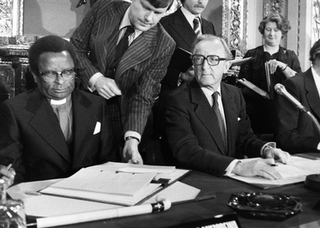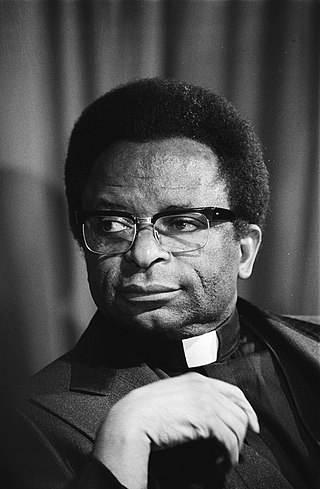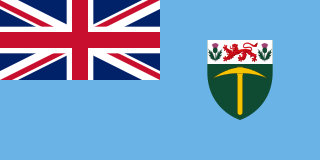
Rhodesia, officially from 1970 the Republic of Rhodesia, was an unrecognised state in Southern Africa from 1965 to 1979. During this fourteen-year period, Rhodesia served as the de facto successor state to the British colony of Southern Rhodesia, and in 1980 it became modern day Zimbabwe.

Southern Rhodesia was a landlocked, self-governing British Crown colony in Southern Africa, established in 1923 and consisting of British South Africa Company (BSAC) territories lying south of the Zambezi River. The region was informally known as South Zambesia until annexation by Britain, at the behest of Cecil Rhodes's British South Africa Company. The bounding territories were Bechuanaland (Botswana), Northern Rhodesia (Zambia), Portuguese Mozambique (Mozambique) and the Transvaal Republic.

Zimbabwe-Rhodesia, alternatively known as Zimbabwe Rhodesia, also informally known as Zimbabwe or Rhodesia, was a short-lived sovereign state that existed from 1 June 1979 to 18 April 1980, though it lacked international recognition. Zimbabwe Rhodesia was preceded by another state named the Republic of Rhodesia and was briefly under a British-supervised transitional government sometimes referred to as a reestablished Southern Rhodesia, which according to British constitutional theory had remained the lawful government in the area after Unilateral Declaration of Independence (UDI) in 1965. Following the 1980 Southern Rhodesian general election, the country was granted internationally-recognized independence within the Commonwealth as the Republic of Zimbabwe.

The Lancaster House Agreement is an agreement signed on 21 December 1979 in Lancaster House, following the conclusion of a constitutional conference where different parties discussed the future of Zimbabwe Rhodesia, formerly known as Rhodesia. The agreement effectively concluded the Rhodesian Bush War. It also marked the nullification of Rhodesia's Unilateral Declaration of Independence, as British colonial authority was to be restored for a transition period, during which free elections under supervision by the British government would take place. Crucially, ZANU and ZAPU, the political wings of ZANLA and ZIPRA, would be permitted to stand candidates in the forthcoming elections. This was however conditional to compliance with the ceasefire and the verified absence of voter intimidation.

The Rhodesian Bush War, also known as the Rhodesian Civil War, Second Chimurenga as well as the Zimbabwe War of Independence, was a civil conflict from July 1964 to December 1979 in the unrecognised country of Rhodesia.

The Internal Settlement was an agreement which was signed on 3 March 1978 between Prime Minister of Rhodesia Ian Smith and the moderate African nationalist leaders comprising Bishop Abel Muzorewa, Ndabaningi Sithole and Senator Chief Jeremiah Chirau. After almost 15 years of the Rhodesian Bush War, and under pressure from the sanctions placed on Rhodesia by the international community, and political pressure from South Africa, the United Kingdom, and the United States, the Rhodesian government met with some of the internally based moderate African nationalist leaders in order to reach an agreement on the political future for the country.

General elections were held in Rhodesia in April 1979, the first where the majority black population elected the majority of seats in parliament. The elections were held following the Internal Settlement negotiated by the Rhodesian Front government of Ian Smith and were intended to provide a peaceful transition to majority rule on terms not harmful to White Rhodesians. In accordance with the Internal Settlement, on 1 June, Rhodesia officially became the nation of Zimbabwe Rhodesia, under the government of the United African National Council elected in the 1979 elections. The Internal Settlement was not approved internationally but the incoming government under Bishop Abel Muzorewa did decide to participate in the Lancaster House talks which led to the end of the dispute and the creation of Zimbabwe.

General elections were held in Southern Rhodesia between 14 February and 4 March 1980 to elect the members of the House of Assembly of the first Parliament of the independent Zimbabwe. As stipulated by the new Constitution of Zimbabwe produced by the Lancaster House Conference, the new House of Assembly was to comprise 100 members, 80 of whom would be elected proportionally by province by all adult citizens on a common roll, and 20 of whom would be elected in single-member constituencies by whites on a separate roll.

The history of Rhodesia from 1965 to 1979 covers Rhodesia's time as a state unrecognised by the international community following the predominantly white minority government's Unilateral Declaration of Independence on 11 November 1965. Headed by Prime Minister Ian Smith, the Rhodesian Front remained in government until 1 June 1979, when the country was reconstituted as Zimbabwe Rhodesia.
During the 1960s, many independence movements emerged in countries near Rhodesia, which had significant effects on political affairs and social conditions within Rhodesia.
United Nations Security Council Resolution 333, adopted on May 22, 1973, after reiterating previous statements and admitting that previous measures had yet failed to bring about the end of the "illegal regime in Southern Rhodesia" the Council condemned South Africa and Portugal for failing to co-operate with the implementation of sanctions and requested that urgent action be taken to implement them. The Council then requested that states with legislation permitting importation from Rhodesia repeal it immediately and called upon states to enact and enforce legislation against any person who tries to evade of commit a breach of sanctions by:

Zimbabwe and the Commonwealth of Nations have had a controversial and stormy diplomatic relationship. Zimbabwe is a former member of the Commonwealth, having withdrawn in 2003, and the issue of Zimbabwe has repeatedly taken centre stage in the Commonwealth, both since Zimbabwe's independence and as part of the British Empire.

In United Nations Security Council Resolution 423, adopted on March 14, 1978, after recalling its resolutions on Southern Rhodesia, particularly 415 (1977), the Council condemned attempts by the "illegal racist regime" in Southern Rhodesia to retain power and prevent the independence of Zimbabwe. It also criticised the country's executions of political prisoners and actions against neighbouring countries.

United Nations Security Council resolution 455, adopted on 23 November 1979, after taking note of representations from Zambia and recalling Resolution 424 (1978), the Council expressed concern and condemned the "illegal racist regime" in Southern Rhodesia for its "sustained pattern of violations aimed at destroying the economic infrastructure" of Zambia and causing a number of deaths.
United Nations Security Council resolution 460, adopted on 21 December 1979, after taking note of the Lancaster House Agreement, the council decided to terminate measures taken against Southern Rhodesia in resolutions 232 (1966) and 253 (1968) and any subsequent resolutions. The resolution deplored the "loss of life, waste and suffering" over the past 14 years caused by the rebellion in southern Rhodesia.

The modern political history of Zimbabwe starts with the arrival of white people to what was dubbed Southern Rhodesia in the 1890s. The country was initially run by an administrator appointed by the British South Africa Company. The prime ministerial role was first created in October 1923, when the country achieved responsible government, with Sir Charles Coghlan as its first Premier. The third premier, George Mitchell, renamed the post prime minister in 1933.

Rhodesian passports were passports issued by the government of Rhodesia to its citizens for purposes of international travel. They are no longer issued, having been superseded by Zimbabwean passports in 1980, with the country's reconstitution and renaming as Zimbabwe. Rhodesian passports were ostensibly valid for travel by Rhodesians anywhere in the world, but in practice they were accepted by very few countries.

Relations between the UK and Zimbabwe have been complex since the latter's independence in 1980. The territory of modern Zimbabwe had been colonised by the British South Africa Company in 1890, with the Pioneer Column raising the Union Jack over Fort Salisbury and formally establishing company, and by extension, British, rule over the territory. In 1920 Rhodesia, as the land had been called by the company in honour of their founder, Cecil Rhodes, was brought under jurisdiction of the Crown as the colony of Southern Rhodesia. Southern Rhodesia over the decades following its establishment would slowly be populated by large numbers of Europeans emigrants who came to form a considerable diaspora, largely consisting of Britons but also smaller groups of Italians, Greeks and Afrikaners. A settler culture that had already existed since the time of company would come to cement fully and the white population began to identify as Rhodesians, often in conjunction with British/Afrikaner/Southern European identities of their ancestors. Southern Rhodesia would go on to participate heavily in both the First and Second wars, providing soldiers and military equipment to the British war effort.

The Rhodesia Information Centre (RIC), also known as the Rhodesian Information Centre, the Rhodesia Information Service, the Flame Lily Centre and the Zimbabwe Information Centre, represented the Rhodesian government in Australia from 1966 to 1980. As Australia did not recognise Rhodesia's independence, it operated on an unofficial basis.
The Rhodesian government actively recruited white personnel from other countries from the mid-1970s until 1980 to address manpower shortages in the Rhodesian Security Forces during the Rhodesian Bush War. It is estimated that between 800 and 2,000 foreign volunteers enlisted. The issue attracted a degree of controversy as Rhodesia was the subject of international sanctions that banned military assistance due to its illegal declaration of independence and the control which the small white minority exerted over the country. The volunteers were often labelled as mercenaries by opponents of the Rhodesian regime, though the Rhodesian government did not regard or pay them as such.















